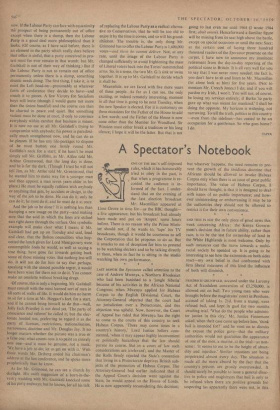LAST MONTH the Spectator called attention to the case of
Andrew Mwenya, a Northern Rhodesian who had been banished to a 'jungle Siberia' because of his activities in the African National Congress; when Mwenya applied for Habeas Corpus to the English Divisional Court, the Attorney-General objected that the court had no jurisdiction over a Protectorate, and this objection was upheld. Now, however, the Court of Appeal has ruled that Mwenya has the right to come to the courts of this country to seek Habeas Corpus. 'There may come times in a country's history,' Lord Justice Sellers com- mented, 'when it may appear highly inconvenient or politically hazardous that the law should pursue its course. But in a court of law such considerations are irrelevant'; and the Master of the Rolls firmly rejected the State's contention that living in a Protectorate deprives British sub- jects of the protection of Habeas Corpus. The Attorney-General had earlier indicated that if the Appeal Court's decision went against the State, he would appeal to the House of Lords. He is now apparently reconsidering this decision; but whatever happens, the need remains to pre- vent the growth of the insidious doctrine that Africans should be allowed to invoke Habeas Corpus only when there is an issue of great public importance. The value of Habeas Corpus, I should have thought, is that it is designed to deal with issues of no public importance; and how- ever uninteresting or embarrassing it may be to the authorities they should not be allowed to restrict it for their own convenience.
* * *






































 Previous page
Previous page